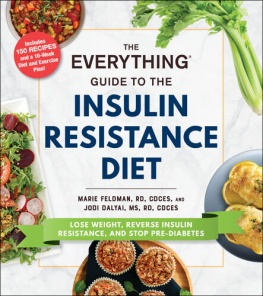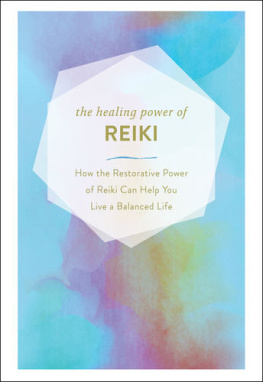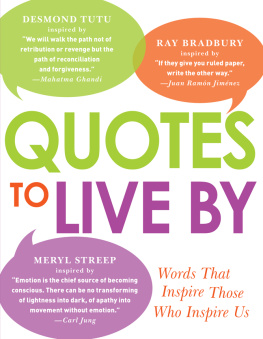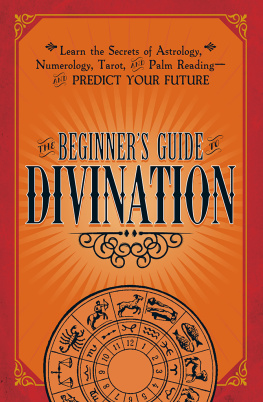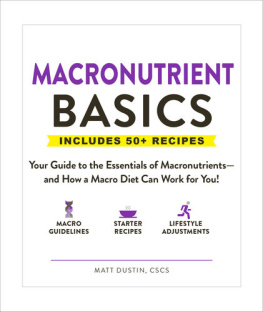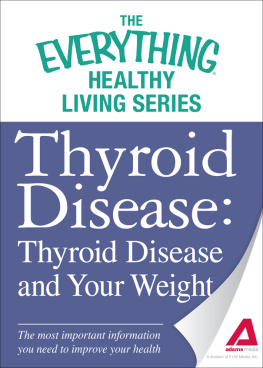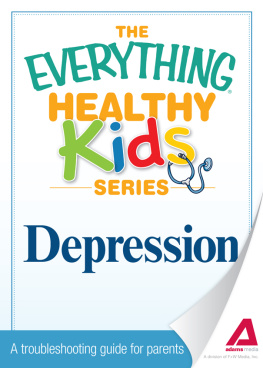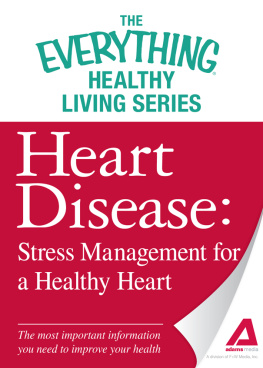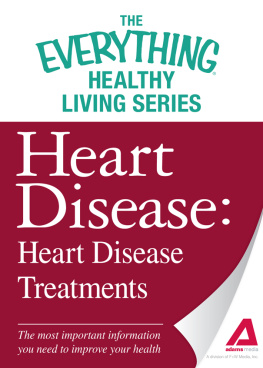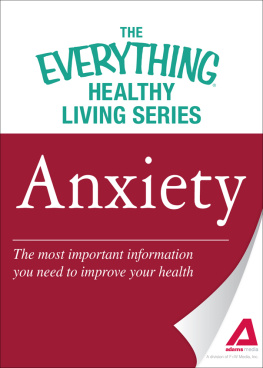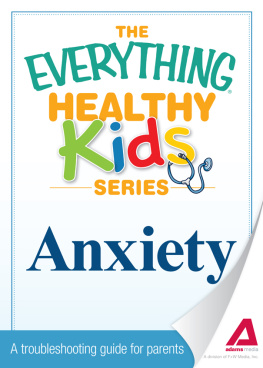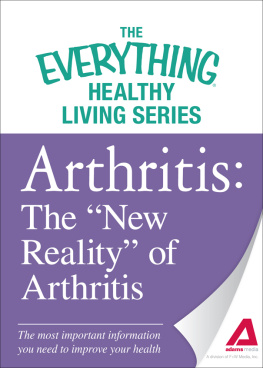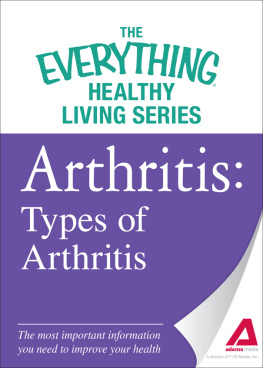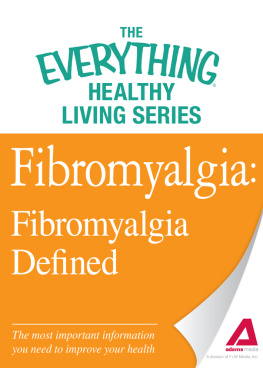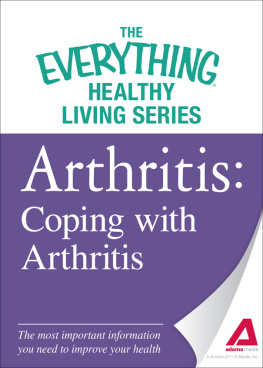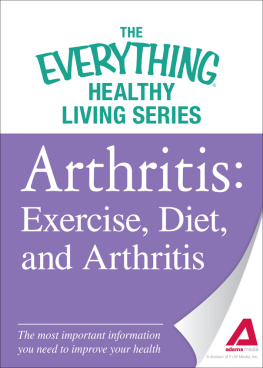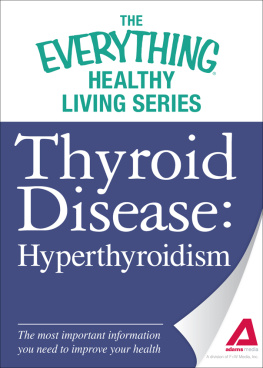Adams Media, a division of F+W Media, Inc.
For more than 10 years, millions of readers have trusted the bestselling Everything series for expert advice and important information on health topics ranging from pregnancy and postpartum care to heart health, anxiety, and diabetes. Packed with the most recent, up-to-date data, Everything health guides help you get the right diagnosis, choose the best doctor, and find the treatment options that work for you.
The Everything Healthy Living Series books are concise guides, focusing on only the essential information you need. Whether youre looking for an overview of traditional and alternative migraine treatments, advice on starting a heart-healthy lifestyle, or suggestions for finding the right medical team, theres an Everything Healthy Living Book for you.
Depression
If you or a loved one is suffering from depression, you know what a challenge life with this condition can be. Some days your depression probably feels insurmountable; other days you may feel okay, but still somethings not quite right. In short, depression can become a controlling force in your life. But it doesnt have to be. Theres never a good time to suffer from depression, but youre battling it at the best time in history to do so.
Researchers are making significant inroads into understanding the causes of depression. This is the first step toward a cure. It may seem that a cure is a long ways off, but life and science move quickly these days; todays commonplace items were yesterdays wild dreams. Where science is concerned, its a good idea to keep current. Any day that one item youve been hoping for may come along.
Also, the medical community and society at large are more tolerant and accepting of the idea of depression as a legitimate condition than ever before. Dismissive reactions and harsh stigmas are fading away. People are more eager to seek help for depression, as well as to offer it to those in need. There are countless books out there on the subject, and new medications and therapies are emerging every day.
Depression is not all in your mind. You know that, because you feel lousy all over, and now science agrees with you. Depression involves both your brain and your body. Its called the mind/body connection. Treating depression, then, becomes a holistic endeavor. Today there are antidepressant medications that work quite effectively to manage many kinds of depression, and psychotherapy, called talk therapy, can help you find the root causes of your depression. Together, antidepressants and psychotherapy, combined with positive lifestyle changes, work well to keep depression under control and manage its symptoms.
If terms such as psychotherapy are still a bit foreign and frightening to you, dont worry. This book will give you an introduction to depression, the various ways to deal with it, and all the details in between. Youll read about choosing the right therapist for your needs, the benefits and risks of alternative therapies, the necessity of exercise, and the importance of a good diet. And you probably have questions about how youll cope on a daily basis. What about work? Will your job be in jeopardy if you cant keep up your former level of productivity? What about your relationships? Will they survive such a test? These are honest questions that deserve compassionate and realistic answers. In this guide, youll find those answers. Remember, knowledge is power.
Acknowledging that you need help is the first step toward getting that help, and just picking up this book is a step in the direction of a better life. Theres no time like the present to make a change for the better!
If youd like to learn more about depression, check out The Everything Health Guide to Depression , available in print (978-1-59869-407-9) and eBook (978-1-60550-212-0) formats.
Broad Look at Depression
You cant put your finger on it. You cant tell somebody where it hurts. All you know for sure is that somethings not right. Perhaps youre feeling sluggish, with some vague aches and pains, or youre grouchy and irritable. It seems that at times its almost impossible to work up any enthusiasm about anything. Other times, little things you usually brush off are really getting to you. What youre experiencing could be depression.
A Working Definition of Depression
Want the concise version? The U.S. National Library of Medicine and the National Institutes of Health (NIH) define depression as a treatable medical illness. Thats pretty vague, but it contains three essential components. In reverse order, heres what each one means:
- Illness: Depression is an illness with specific, characteristic symptoms that produce changes in the way you feel about yourself, your world, and your life. To qualify as depression, these symptoms must be ongoing for at least two weeks.
- Medical: Depression is real. Its not a figment of your imagination. It exists and it hurts. It affects your body, your mind, and your emotions.
- Treatable: There is no cure for depression, but it can be treated. It can be managed with lifestyle changes, medications, psychotherapy, or a combination of these.
Psychologists refer to this condition as clinical depression a psychiatric disorder characterized by certain symptoms, including an inability to concentrate, sleeping too little or too much, loss of appetite or eating more than usual, anhedonia, irritability, lack of energy, feelings of extreme sadness, guilt, helplessness, hopelessness, and sometimes, thoughts of death.
Question
What is anhedonia?
Anhedonia is a term used in psychology. It refers to an inability to experience pleasure from events or activities that should be pleasurable. These events can range from eating and drinking to pursuing hobbies and sports and socializing. This includes sex!
Youll sometimes hear clinical depression called unipolar disorder. This is to distinguish it from bipolar disorder. Uni- and bi- are Latin prefixes, meaning one and two. In unipolar disorder, moods are consistently low. In bipolar disorder, two moods extreme elation and extreme sadness are involved, usually with periods of normal feelings in between. Depression can take many guises.
Creating a useful, comprehensive, working definition of depression is challenging. The essentials, however, are that depression is a treatable medical illness with symptoms that impact your physical, emotional, and mental well being. Since symptoms can worsen over time, depression should be treated.
What Are the Causes?
There are many kinds of depressive disorders, some more serious than others. It seems that depression has a wide variety of ways to enter your life:
- Some kinds of depression seem to run in families, so you may have a genetic predisposition to depression.
- Trauma and stressful life events can cause depression. The trauma doesnt have to have involved you personally to affect you. Stressful life events that can lead to depression include divorce, financial setbacks, chronic illness, loss of a job, and so forth.
- Hormones can cause depression. This means either a rise in hormone levels or a drop in them. Testosterone in men and progesterone and estrogen in women may be the culprits.


